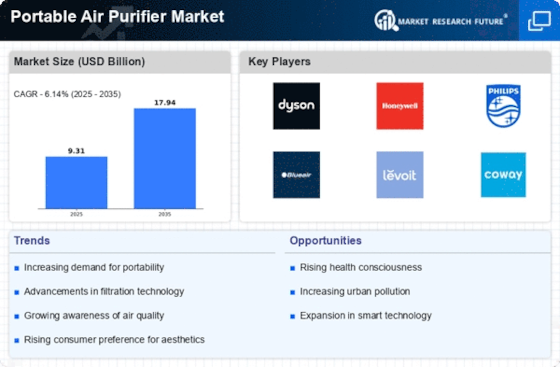Market Trends
Key Emerging Trends in the Portable Air Purifier Market
Air pollution poses a significant threat to global health, ranking among the most critical environmental risks. By mitigating air pollution, nations have the potential to alleviate the health burden associated with various diseases, including stroke, heart disease, lung cancer, and respiratory conditions like asthma. The impact on cardiovascular and respiratory health is evident both in the short and long term, underscoring the importance of reducing air pollution levels. Shockingly, in 2019, 99% of the global population resided in areas where the air quality fell short of the guidelines set by the World Health Organization (WHO). Outdoor air pollution, prevalent in both urban and rural settings, was responsible for an estimated 4.2 million premature deaths worldwide in 2016. Strikingly, 91% of these untimely fatalities occurred in low- and middle-income countries, with the WHO South-East Asia and Western Pacific regions being the hardest hit. To address this pressing issue, policies and investments are crucial, focusing on cleaner transportation, energy-efficient homes, sustainable power generation, environmentally conscious industry practices, and improved municipal waste management. Implementing these measures can effectively curtail major sources of outdoor air pollution, fostering a healthier living environment. Beyond outdoor pollution, indoor air quality is a substantial concern, particularly for approximately 2.4 billion individuals who rely on biomass, kerosene fuels, and coal for cooking and heating. Tackling these indoor sources of pollution is vital for safeguarding the health of vulnerable populations. In conclusion, concerted efforts on a global scale are imperative to combat air pollution, encompassing a multifaceted approach that addresses both outdoor and indoor sources to ensure a healthier and sustainable future for populations worldwide.
Furthermore, the adverse health effects of air pollution extend beyond the visible impacts on respiratory and cardiovascular health. Long-term exposure to polluted air has been linked to a range of systemic health issues, including developmental problems in children, adverse pregnancy outcomes, and an increased risk of neurodegenerative diseases. Additionally, air pollution has far-reaching ecological consequences, contributing to climate change, acid rain, and the deterioration of ecosystems. The interconnected nature of these environmental challenges emphasizes the need for comprehensive strategies that not only prioritize human health but also address the broader environmental implications.


















Leave a Comment